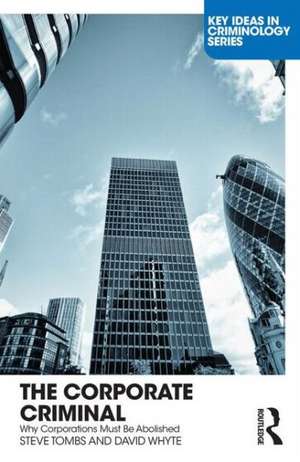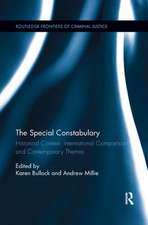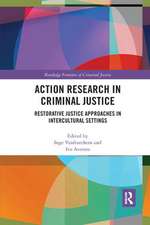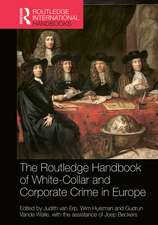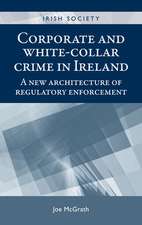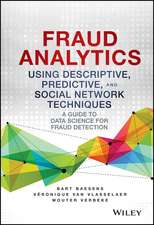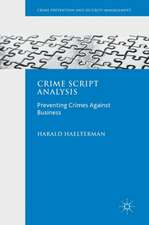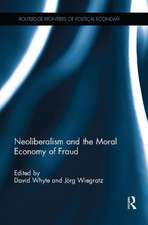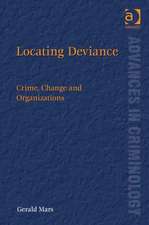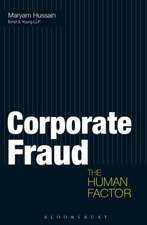The Corporate Criminal: Why Corporations Must Be Abolished: Key Ideas in Criminology
Autor Steve Tombs, David Whyteen Limba Engleză Paperback – 7 apr 2015
| Toate formatele și edițiile | Preț | Express |
|---|---|---|
| Paperback (1) | 293.97 lei 3-5 săpt. | +13.96 lei 7-11 zile |
| Taylor & Francis – 7 apr 2015 | 293.97 lei 3-5 săpt. | +13.96 lei 7-11 zile |
| Hardback (1) | 761.76 lei 6-8 săpt. | |
| Taylor & Francis – 3 apr 2015 | 761.76 lei 6-8 săpt. |
Preț: 293.97 lei
Nou
Puncte Express: 441
Preț estimativ în valută:
56.26€ • 61.09$ • 47.26£
56.26€ • 61.09$ • 47.26£
Carte disponibilă
Livrare economică 01-15 aprilie
Livrare express 18-22 martie pentru 23.95 lei
Preluare comenzi: 021 569.72.76
Specificații
ISBN-13: 9780415556378
ISBN-10: 0415556376
Pagini: 226
Ilustrații: 1 Tables, black and white
Dimensiuni: 129 x 198 x 17 mm
Greutate: 0.23 kg
Ediția:1
Editura: Taylor & Francis
Colecția Routledge
Seria Key Ideas in Criminology
Locul publicării:Oxford, United Kingdom
ISBN-10: 0415556376
Pagini: 226
Ilustrații: 1 Tables, black and white
Dimensiuni: 129 x 198 x 17 mm
Greutate: 0.23 kg
Ediția:1
Editura: Taylor & Francis
Colecția Routledge
Seria Key Ideas in Criminology
Locul publicării:Oxford, United Kingdom
Public țintă
Postgraduate and UndergraduateCuprins
1. Introducing The Corporate Criminal 2. Crime, Harm And The Corporation 3. Constructing The Corporation 4. The Corporation As Structured Irresponsibility 5. Controlling The Corporation? 6. Conclusion. What is to be done about the corporate criminal?
Notă biografică
Steve Tombs is Professor of Criminology at the Open University. He has a long-standing interest in the incidence, nature and regulation of corporate crime. He works closely with the Hazards movement in the UK, and is a Trustee and Board member of Inquest.
David Whyte is Professor of Socio-legal Studies at the University of Liverpool where he teaches and does research on the relationship between law, politics and corporate power. He works closely with Corporate Watch and is a member of the executive committee of the Institute of Employment Rights.
David Whyte is Professor of Socio-legal Studies at the University of Liverpool where he teaches and does research on the relationship between law, politics and corporate power. He works closely with Corporate Watch and is a member of the executive committee of the Institute of Employment Rights.
Recenzii
Few academic books demand the kind of critical attention that The Corporate Criminal demands.
This is surely the most powerful and compelling critique of the corporation ever written. Tombs and Whyte pull no punches in this arrestingly accessible but scholarly book. Their argument is simple – its legal and historical construction is such that the resulting corporation is endemically criminogenic and thus beyond reform. Their conclusion is utterly persuasive, ‘the goal of corporate opposition must be the abolition of the corporation’ - Penny Green is Professor of Law and Globalisation and Director of the International State Crime Initiative at Queen Mary University of London, UK
Tombs and Whyte provide a brilliant, unflinching and original account of corporate power in neoliberal capitalism. Their careful analysis – rich in both empirical and theoretical insights - convincingly reveals that corporations cannot balance economic progress with social welfare, but also that the only effective corrective is to disassemble the corporate form. This superb book is a must read for anyone wishing to understand how and why corporations have come to define and destroy our daily lives, and what do about it. – Susanne Soederberg, Queen’s University, Canada
It is clear that today, everyone is aware of the devastating effects of corporate capitalism on the environment, global inequality, and various other aspects of our societies and daily lives. What is utterly refreshing about Tombs and Whyte’s book, is the realisation that none of these effects can be mitigated by legal reform or neoliberal regimes such as ‘corporate social responsibility’. What is needed is a revolution in our thinking about, and action towards, corporate capitalism, and Tombs and Whyte’s call to ‘bring down the corporation’ deserves to be carried far and wide. - Grietje Baars, The City Law School, City University London.
This book offers readers a provocative brief for the case that corporations are in fact not a sustainable enterprise, and that their inherently criminal and criminogenic nature must be fully recognized.— David O. Friedrichs, Criminal Law and Criminal Justice Books (Rutgers University)
This is surely the most powerful and compelling critique of the corporation ever written. Tombs and Whyte pull no punches in this arrestingly accessible but scholarly book. Their argument is simple – its legal and historical construction is such that the resulting corporation is endemically criminogenic and thus beyond reform. Their conclusion is utterly persuasive, ‘the goal of corporate opposition must be the abolition of the corporation’ - Penny Green is Professor of Law and Globalisation and Director of the International State Crime Initiative at Queen Mary University of London, UK
Tombs and Whyte provide a brilliant, unflinching and original account of corporate power in neoliberal capitalism. Their careful analysis – rich in both empirical and theoretical insights - convincingly reveals that corporations cannot balance economic progress with social welfare, but also that the only effective corrective is to disassemble the corporate form. This superb book is a must read for anyone wishing to understand how and why corporations have come to define and destroy our daily lives, and what do about it. – Susanne Soederberg, Queen’s University, Canada
It is clear that today, everyone is aware of the devastating effects of corporate capitalism on the environment, global inequality, and various other aspects of our societies and daily lives. What is utterly refreshing about Tombs and Whyte’s book, is the realisation that none of these effects can be mitigated by legal reform or neoliberal regimes such as ‘corporate social responsibility’. What is needed is a revolution in our thinking about, and action towards, corporate capitalism, and Tombs and Whyte’s call to ‘bring down the corporation’ deserves to be carried far and wide. - Grietje Baars, The City Law School, City University London.
This book offers readers a provocative brief for the case that corporations are in fact not a sustainable enterprise, and that their inherently criminal and criminogenic nature must be fully recognized.— David O. Friedrichs, Criminal Law and Criminal Justice Books (Rutgers University)
Descriere
This book interrogates the concept of corporate 'personhood' to understand the nature of corporate criminality and the prospects for more effective corporate control. Linking debates in criminology to broader claims around corporate social responsibility, it provides an understanding of the key ideas that explain the role of the corporation in the global economy.
